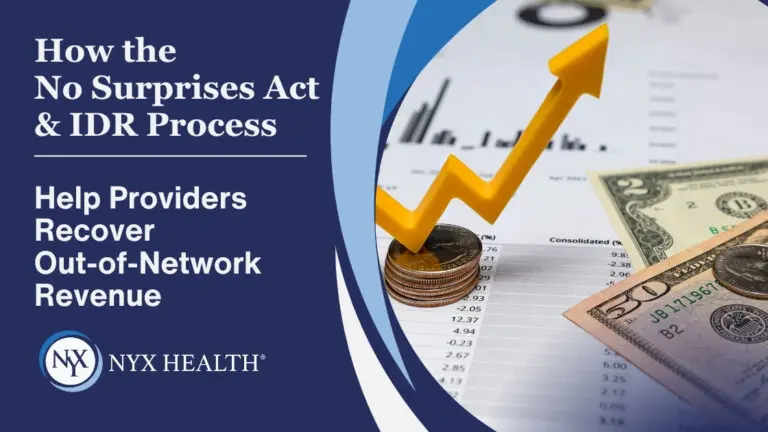How the No Surprises Act and IDR Process Help Providers Recover Out-of-Network Revenue

In today’s healthcare environment, providers face constant pressure to secure fair reimbursement, especially for out-of-network services. The No Surprises Act (NSA), implemented in January 2022, was designed to protect patients from unexpected medical bills—but it also created a new pathway for providers to dispute inadequate payments through the Independent Dispute Resolution (IDR) process (Centers for Medicare & Medicaid Services, 2024).
For hospitals, health systems, and specialty provider groups, understanding and effectively using the IDR process can help recover significant out-of-network revenue that might otherwise be written off. Here’s what you need to know.
Understanding the No Surprises Act
The No Surprises Act prohibits surprise billing in many emergency and certain non-emergency situations where patients are unable to choose an in-network provider. Under the law:
- Patients are protected from balance billing.
- Insurers must pay the provider a reasonable amount for out-of-network services.
- When disagreements arise, either party can initiate the federal IDR process to settle the payment amount (CMS, 2024).
What Is the IDR Process?
The Independent Dispute Resolution (IDR) process acts as a form of arbitration between healthcare providers and payers when they can’t agree on reimbursement for certain out-of-network services. Here’s how it works:
- Negotiation Window: After an initial payment or denial, both parties have 30 days to negotiate.
- Initiation of IDR: If no agreement is reached, either party may initiate the IDR process (Brookings Institution, 2023).
- Submission of Offers: Each party submits its best payment offer and supporting documentation to a certified IDR entity (often an Independent Review Organization or IRO).
- Final Decision: The IDR entity selects one offer, based on factors such as median in-network rates, provider experience, and case complexity (Ogletree Deakins, 2023).
The losing party pays the administrative fee, which encourages both sides to submit reasonable offers.
How the IDR Process Helps Providers Recover Lost Revenue
The IDR process is more than a compliance requirement—it’s a strategic opportunity for healthcare organizations to protect and recover out-of-network revenue. Here’s how:
1. Ensures Fair Reimbursement
Insurers sometimes make low initial payments on out-of-network claims. With IDR, providers can challenge these offers and present data to justify a higher payment (Brookings Institution, 2023).
2. Reduces Write-Offs
Instead of absorbing underpayments as bad debt or charity care, the IDR process offers a structured path to recover that revenue legally and efficiently.
3. Creates Leverage in Future Negotiations
A successful IDR track record can give providers leverage in payer contract negotiations and help establish more favorable terms over time (American Academy of Family Physicians, 2024).
4. Encourages Accountability
The possibility of losing in arbitration discourages insurers from low-balling claims, promoting more equitable reimbursement practices.
Common Use Cases for Independent Dispute Resolution (IDR)
IDR is especially useful for:
- Emergency Departments: Where out-of-network status is common and balance billing is no longer allowed.
- Specialty Practices: Like anesthesiology, radiology, and pathology, where patients don’t choose their providers.
- Hospital-Based Physicians: Who often face payer denials or low payments for essential services.
How NYX Health Supports Providers in the IDR Process
At NYX Health, we offer end-to-end IDR Support Services to help providers manage every step of the dispute process. From eligibility reviews to documentation and strategic submission preparation, our team, along with our Independent Review Organization (IRO) partners, ensures you are positioned for the best possible outcome.
We help providers:
- Identify eligible claims
- Prepare and submit winning IDR cases
- Track trends in payer behavior
- Recover revenue quickly and compliantly
The No Surprises Act may have eliminated surprise billing, but it didn’t eliminate your right to fair payment. With the proper strategy and support, the IDR process can become a valuable tool in your revenue recovery arsenal.
If your organization is writing off more out-of-network revenue than it should, it’s time to explore a smarter way forward. Contact NYX Health today to learn how our IDR support services can protect your bottom line.
References
- Centers for Medicare & Medicaid Services (CMS). (2024). No Surprises Act – IDR Process Overview. CMS.gov
- Brookings Institution. (2023). A first look at outcomes under the No Surprises Act arbitration process. Brookings.edu
- Ogletree Deakins. (2023). Federal court invalidates parts of the independent dispute resolution process. Ogletree.com
- American Academy of Family Physicians (AAFP). (2024). Changes to the No Surprises Act’s IDR process. AAFP.org
Get Started Today!
Ready to simplify operations, boost revenue, and get back to what matters most—patient care?
Partner with NYX Health and experience the difference.
